
As England’s stone-chiselled colossus Alastair Cook nears his 10,000th Test run, he talks Ed Kemp through the defining trials and triumphs of a historic batting career.
Alastair Cook is talking about his relationship with batting. I suggest it must dominate his thinking – a sort of constant companion in his life, and in his own inner world.
“It doesn’t dominate my thinking as much as people think it does,” be begins to argue, “but it is something you always go back to. You’re driving along and you start thinking about your batting, you start thinking about this or that. But I have managed – and maybe that’s one of the reasons for my longevity – to park my batting when I get away from batting. You are right though, it does engross you, because it’s what we do, it’s what you want to be the best at.”
While he’s done his share of tinkering with his technique over the years – of which more later – these thoughts are not, primarily, technical.
“It’s more about… I suppose the danger is the self-doubt, which every person has, and keeps popping into your head, and you try and knock it out of your head and try and carry on.”
The astonishing numbers Cook has so methodically accumulated down the years serve as ballast when the regular bouts of insecurity threaten to destabilise.
“I think you come to a stage in your career now… I’d find it hard setting out again and proving to people that you can play. It’s nice knowing that you have done it and, while you’re always looking to get better, you know that actually you’ve produced some goods along the way, so I haven’t really got to prove to anyone anymore that I can play Test cricket. You have got the scars. You can hold your head up high with what you have achieved. But I would like to achieve more, so you’ve got to keep working hard.”
He is, he needs no need reminding, on the cusp of becoming England’s first-ever 10,000 man. He’d thought he might get over the line in the winter (“I should have done it in South Africa, so no one would be talking about it now,” he admits – ever happiest with fuss at a minmum) but while he led the historic series win, he only returned 184 runs with the bat across the four Tests, leaving him with 36 to get this summer.
How does he view a milestone like this? “It’s an interesting one, because you’re joining a very elite group of players who have managed to do it. It’ll be nice to get it but like everything, you don’t want to finish on 10,000 runs, you want to score more than that.
“But when I was 18, or when I’d just played Test cricket once, or when I was struggling in certain parts of my career and I couldn’t buy a run, if someone said you’ve got a chance of scoring 10,000 runs you’d laugh at them. You’ve got to be very careful what you wish for but hopefully I can play for a few more years yet and it’s not just a case of 10,000 and then that’s it.”
There’s more he wants to do, and no doubt he’ll draw on the ups and downs of the past to help him. There have been quite a few of both.
THE DREAM DEBUT
60 (160) & 104* (243) | India v England, 1st Test, Nagpur | 2006
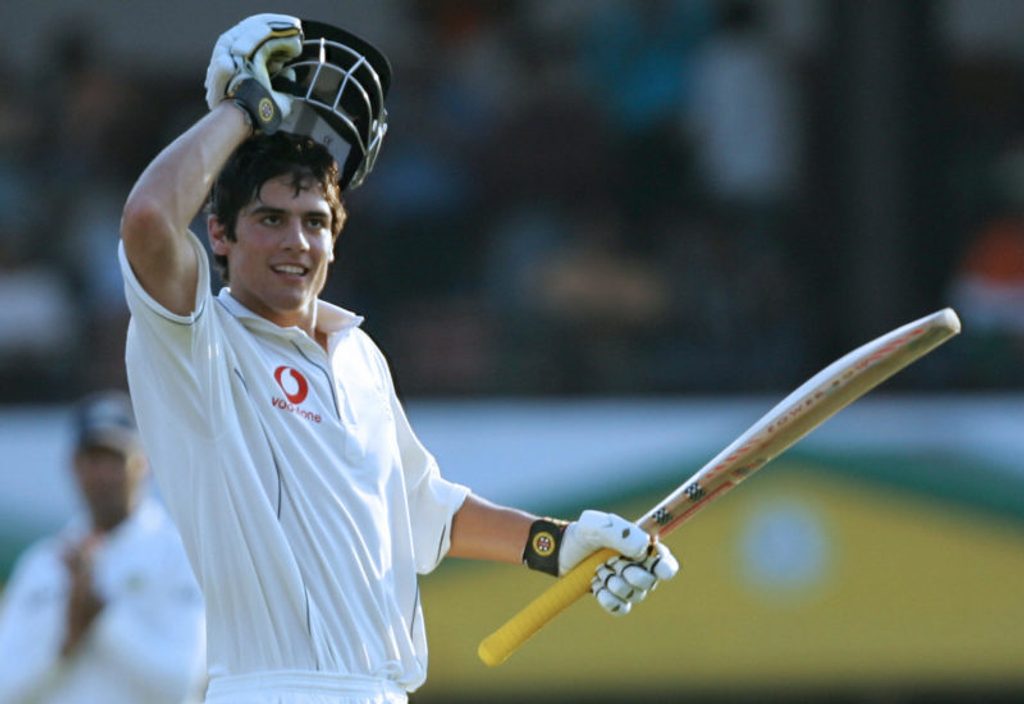
With the senior side preparing for the first Test in India shorn of both Michael Vaughan and Marcus Trescothick, 21-year-old Cook – on an A tour in the Caribbean at the time – was called up as a late replacement to make a debut at the top of the order. A whirlwind week that started on a beach in Antigua, ended in India as a Test centurion.
“In terms of pure emotion and pure bemusement that I got a hundred and what happened in that week for my life – I will never ever forget that. That moment I cut Harbhajan for four, that pure joy of scoring a hundred for England, and to do it in your second innings, was such a special moment.
“I suppose fate always has something to do with it, looking back now. Dave Parsons was a coach with the academy and I was lying on a beach in Antigua and he said, ‘Have you set a goal of when you want to play for England?’ And I said, ‘Well, no. I just want to have the opportunity to play.’ And that was a week before I scored a hundred. You looked at the England side – and I’d been on a tour as an injury replacement to Pakistan before, but the side looked settled and it didn’t look like, for a few years, anyone else would get a chance. And then a week later, to be flying around the world, to making your debut and score a hundred… it was surreal. To do it straight away just gave me so much confidence that I could play at international level, and helped me so much, so I was grateful for a couple of dropped catches along the way.
“In the second game [at Mohali] I remember hitting my first ball for four and thinking, ‘Well, this is alright…’ and then I struggled – I think I scored 17 and 4 or something [17 and 2] – so it was back to earth with a little bit of a bump and then I got ill for the third.
“That month will always live with me just because it happened so quickly. I went from the guy who didn’t know when he was going to play for England to a guy who’d scored a hundred – and it was special to do it on the subcontinent as well.”
THE FOLLOW UP
105 (279) | England v Pakistan, 1st Test, Lord’s | 2006
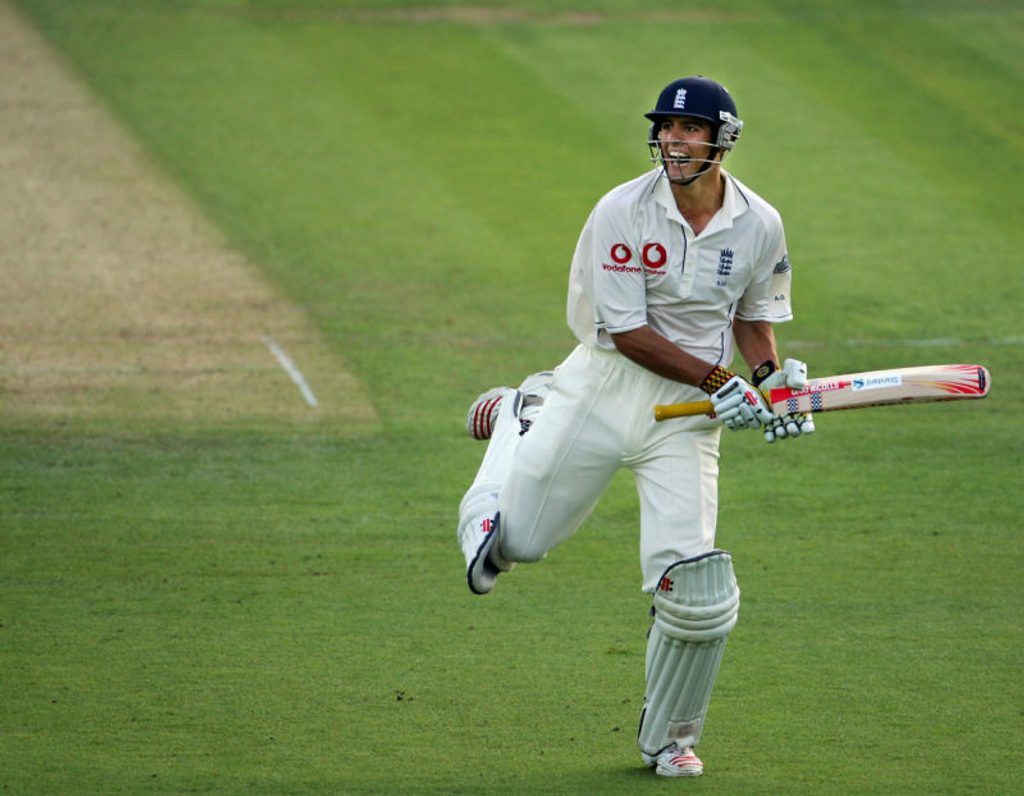
Back in the side at the start of the English summer – now at No.3 following the return of Marcus Trescothick for the 2006 season – Cook’s highest score across the three Tests against Sri Lanka was 89 at Lord’s. But come the visit of Pakistan later in the summer, he would hit two more centuries, with 127 at Old Trafford following this three-figure effort at the home of cricket. Hardly in vintage touch at HQ – he was dropped, missed and not given a few times – Cook carried on regardless in a show of the patience and determination that would come to define him.
“It was a dreadful innings – I should have been out three times and was dropped twice, so I can’t say it was any good, but to score a hundred at Lord’s – I think it was my sixth Test match [it was]– it was a while after my first in terms of time… You never feel quite like you belong in international cricket, but to score a second one it was like, ‘Yeah, I am good enough to play here.’ Anyone can score one, I always think. Every dog has his day. That can be very apt. To then get the second was actually another monkey off my back. I can do it again, and then I suppose it was just a matter of repeating it.”
THE SILVER LINING
116 (290) | Australia v England, 3rd Test, Perth | 2006
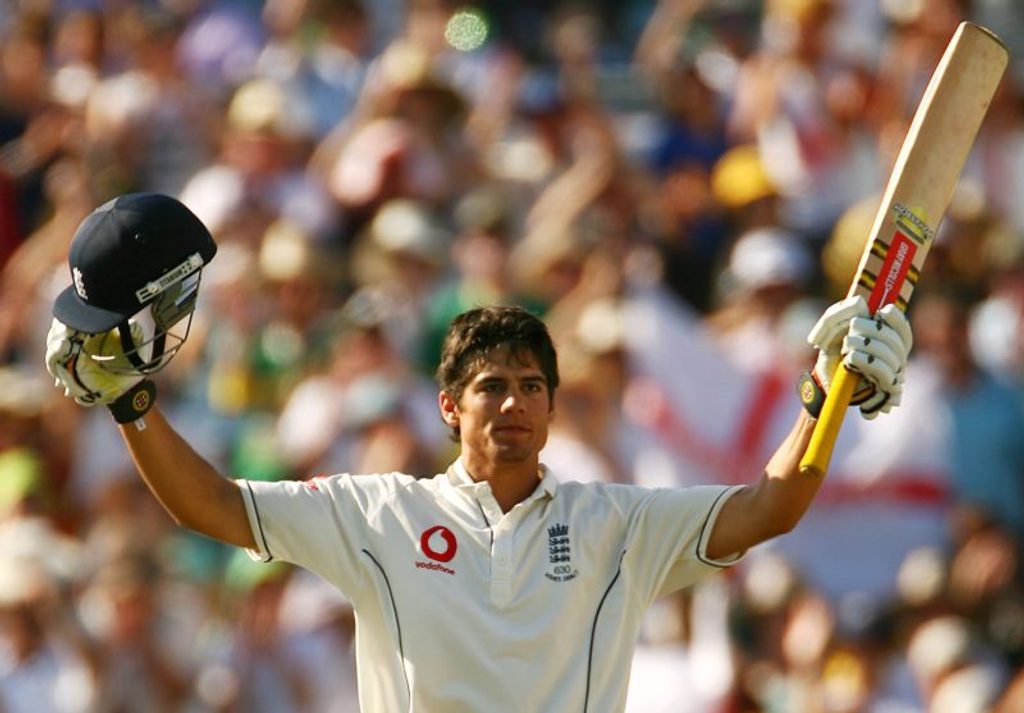
Cook’s first real struggles as a batsman came against one of the great bowling attacks, as part of England’s dismal 5-0 drubbing down under in 2006/07. At the hands of Glenn McGrath, Brett Lee, Stuart Clark and Shane Warne he finished the series with 276 runs at 27.6. But 116 of those runs had come in one meaningful knock in the second innings at the WACA, with England chasing 557 and needing something monumental to avoid conceding the Ashes inside 15 days. They lost, but Cook’s knock – still a week shy of his 22nd birthday – was a substantial achievement on a tour with few bright spots for England’s players and supporters.
“Against that attack as a 21-year-old opening the batting, actually that was… Yeah, I only averaged 20-odd in that series but then to score a hundred away from home against a really good bowling attack… the bowling won’t get any better than that in terms of the quality you’ll face – that gave me a lot of confidence. I thought I must be able to play a little bit.
“I’d kept nicking off and I didn’t nick off in that game. I probably left the ball a little bit better. And they bowled a few more cut and pull balls probably!
“The technical work started after that tour. In my first year I’d scored 1,000 runs and then that tour was the first little blip. And that’s when you start thinking, ‘Actually, they might have worked me out a little bit’ and you start thinking about your game. Obviously you’re always thinking about your game, but I had a couple of months off after there and I thought, ‘Right, I’ve really got to improve around my off stump if I want to become a better player’ because actually, at the highest level, I wasn’t quite good enough on that tour.”
BACK FROM THE BRINK
110 (173) | England v Pakistan, 3rd Test, The Oval | 2010
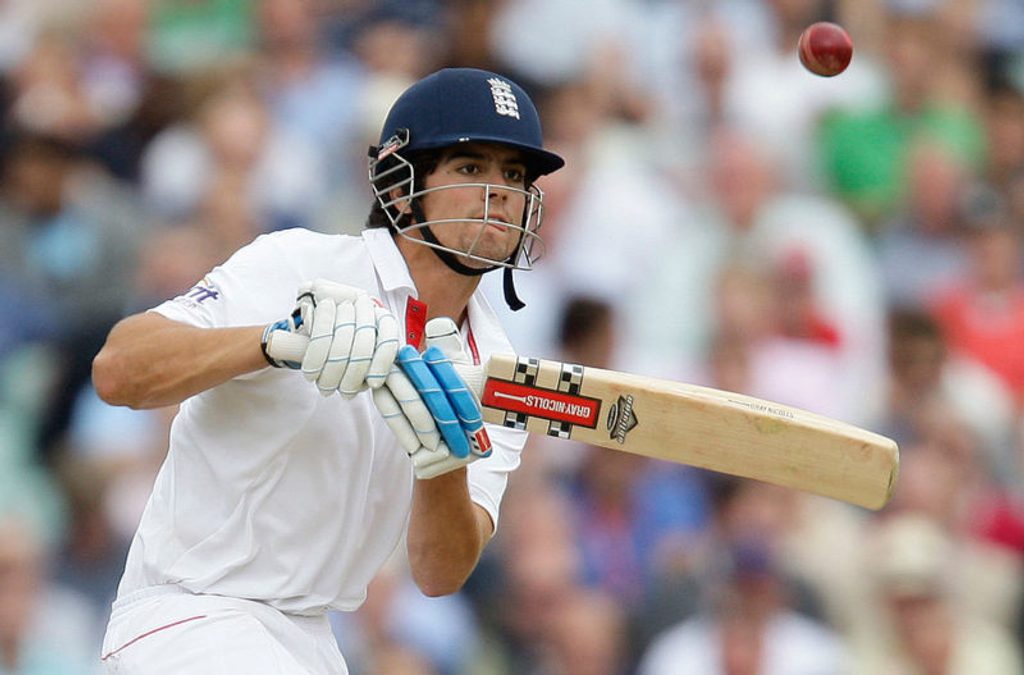
After a run-starved 2009 Ashes in which he averaged just 24.66 across the five Tests, Cook had made the most drastic technical adjustment of his career – developing with his mentor Graham Gooch a more Gooch-like upright stance and an early, straight back- lift. He took this radically different new method to South Africa that winter – where he contributed a century and two fifties to England’s drawn four-match series – and to Bangladesh, where, deputising as captain in place of the rested Andrew Strauss, he made a hundred in both Tests of an England whitewash.
Despite all that, he found himself under immense pressure in the latter part of the 2010 summer. A first-innings 6 at the Oval in the third of four Tests against Pakistan gave him a tally of 106 runs from eight innings that season, with a top score of 29 and average of 13.25. Many in the media were calling for him to be dropped for the final match at Lord’s. Seemingly with one chance left, he reverted to his older, more natural method for the second innings in Kennington and made a rescue century to restore his confidence, secure his place in the side and vindicate Strauss’ faith in him. A few months down the line it would come to be seen as the major turning point of his career.
“It was all part of the cycle of batting I think. After 2009 I changed my technique. I’d played in the Ashes twice and I thought the two times I’d played against the best side I had only averaged 20-odd, so I felt as if I had to change my technique to improve. And again, I scored a few hundreds, but this, my 13th, definitely was the most important. Actually I had stripped off, I went back to my old technique. So I kind of accepted this was the player I was going to be – yes, you can always improve your technique, but I had changed it dramatically – I scored a few runs against Bangladesh, scored a couple of hundreds there and I scored a hundred against South Africa in Durban with that technique, so it wasn’t dreadful, but I didn’t feel very natural doing it. And then when I really struggled to score any runs, went back to my old technique and it kind of happened.”
THE DADDY TOUR
235* (428) | Australia v England, 1st Test, Brisbane | 2010
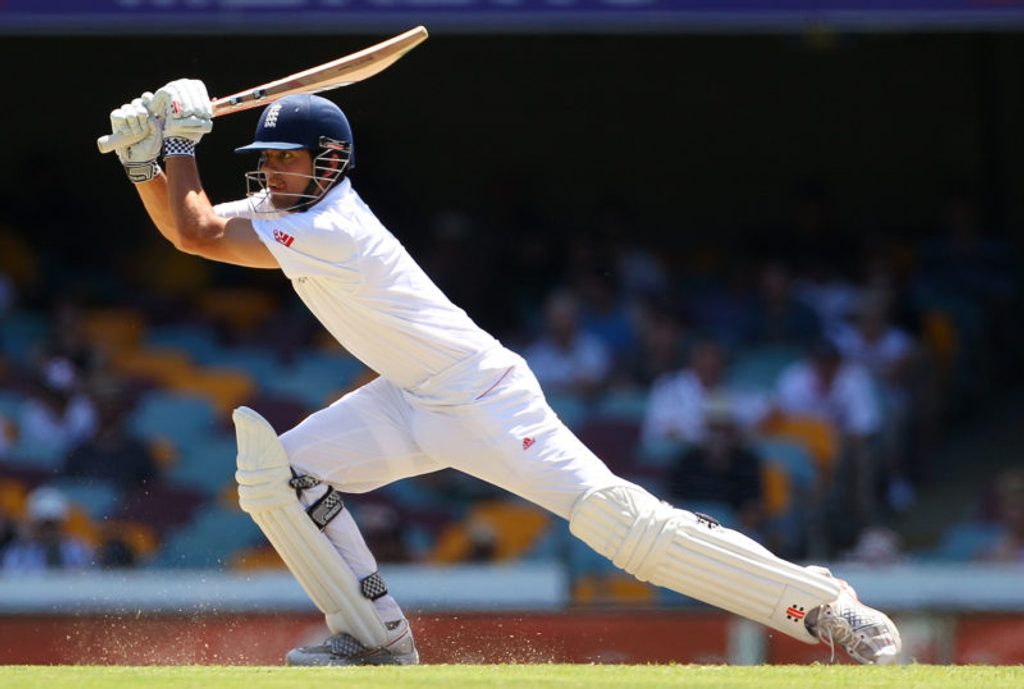
A relentless run-gasm from start to finish, Cook’s finest hour so far came in England’s historic 2010/11 Ashes win. With England 221 runs in arrears heading into their second innings in the first Test at Brisbane, they needed to bat for the better part of two days to save the game. And that’s what Cook did, compiling an immaculate unbeaten 235 as, first accompanied by Strauss, then by Jonathan Trott, he marched England to 517-1 declared to secure the draw and inflict a demoralising two days on Australia. England were dominant for the rest of a series that they would win 3-1, with Cook hitting two more hundreds and finishing the five matches with the Hammond-esque numbers of 766 runs at 127.66.
“At that time I felt like I was an established player without really delivering the goods constantly. In the 2009 Ashes I didn’t score a huge amount of runs either but in between times I’d got a hundred in Sri Lanka, I’d obviously scored a few runs. The first one in Brisbane was my 14th Test hundred, so it wasn’t as if I hadn’t scored runs.
“But the 2010/11 series was when I felt I took another step as a cricketer. In those two years I went from a cricketer who was OK to a bit better than that. I scored 700 runs in the Ashes, and it probably went back to that Pakistan hundred at the Oval. When people were saying I should get dropped, then to score that and go and do what I did in Australia, kind of pushed me up a bit higher. When you have a bit of a low run and then get into a bit of form, you make the most of it.”
THE LEADER
190 (377) | India v England, 3rd Test, Kolkata | 2012
In my career I’ve always, when I’ve been out of form, managed to get 30s and 40s to keep myself in the team, and then when I’m in form I have the ability to go bang, bang, bang
Appointed to the captaincy following Strauss’ retirement, Cook’s first unenviable task was to solve a problem called Kevin Pietersen. The new skipper’s star man was successfully ‘reintegrated’ to the fold after Tweet/Text-Gate and England headed off to India searching for a first series win there since 1984/85. To follow the twin tons he’d made as a stand-in leader in Bangladesh, Cook hit three hundreds in the first three Tests of his full-time tenure, first 176 in defeat at Ahmedabad, then 122 in a dramatic 10-wicket win at Mumbai, as both he and Pietersen drew level with Wally Hammond, Colin Cowdrey and Geoff Boycott on 22 Test centuries.
Then at Kolkata, the records came tumbling. His 190 gave England a commanding lead that would help see them to a 2-1 lead with one (eventually drawn) Test to play, in the process making him his country’s highest-ever century-maker, and also the youngest player – at 27 years and 347 days – to go past 7,000 Test runs; Sachin Tendulkar had been seven months older.
“I am proud of the fact that in a couple of our big away wins I’ve been Man of the Series. That’s probably my proudest little achievement from a selfish point of view: to score those three hundreds in India, the three hundreds in Australia – two places that are very hard to win, to have played significant innings and parts in them, I’m proud of that.
“I’ve got a good record on the subcontinent. I don’t know why – it must mean I can play the spin pretty well. I can never really dominate it, but I can stick around and bat a long period of time.
“I suppose in my career I’ve always, when I’ve been out of form, managed to get 30s and 40s to keep myself in the team, and then when I’m in form I have the ability to go bang, bang, bang, and score a few hundreds in a row. And hopefully I can have another couple of bursts of them.”
THE TEAR JERKER
95 (231) & 70* (114) | England v India, 3rd Test, Southampton | 2014
I might have cried I think, if I’d have got a hundred there
A catastrophic 2013/14 Ashes tour, an exodus of experienced players and another Pietersen scandal made the summer of 2014 the start of a challenging new era for Cook as captain. And after a 1-0 series defeat to Sri Lanka, and then falling 1-0 down from two in the five-match series against India after a dismal display at Lord’s, Cook was under the most severe strain of his career. Not only was he short of runs, having scored just 115 from the four matches of the summer and not having made a hundred since May 2013, but barely a sage in the land could resist calling for his head as captain. Realistically he had one game to save his job.
He responded with what he described as “the perfect game”, getting himself back in the runs as the team achieved a monumental 266-run win which would turn the series. The ovation for his runs on the first day was perhaps the most memorable of any he’s been afforded.
“There are moments which stand out without being attached to a major score. And that week, the support the crowd in Southampton gave me… I saw Rod Bransgrove [Hampshire chairman] after we’d lost at Lord’s and he said: ‘Don’t worry, we’ve got it all sorted at Southampton for you.’ He was so confident that I was going to score runs and England were going to win. I don’t know why but he was right – we had a really good week.
“When I walked off 40 not out at lunch it was like I’d scored 440. It meant a lot, that, with all the other stuff going on at this time. Actually, behind what was being said on Twitter and in the media, it felt like the people who actually cared about English cricket and the English Test team wanted me to carry on as captain.
“It’s one of my regrets, pulling that one down the leg-side [to be caught behind by MS Dhoni off Ravi Jadeja] and not sweeping it because, I don’t know… I might have cried I think, if I’d have got a hundred there, because the reception I got for fifty and the reception I got for 95, I think the whole crowd was gutted that I didn’t get the other five.”








